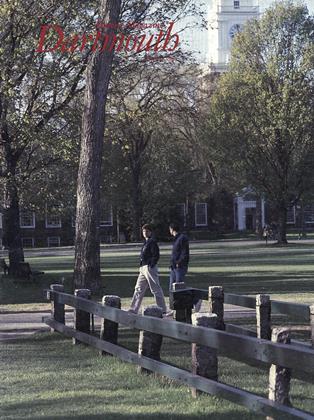At a time when most seniors are busy looking for jobs or applying to graduate schools, a committed group of 'Bss was putting a lot of time into preparing the class's annual intellectual gift to the College: the Senior Symposium.
Work begins on the symposium almost a year ahead. At an organizational meeting last spring, Jonathan Auerbach and David Hillinck were elected co-chairmen. The first order of business was to select a national or world issue as the topic. "We narrowed the topic choices to five," explained Auerbach, "and then people gave presentations on those topics early in the fall term." He said about 80 seniors showed up to help make the decision. The choices were finally narrowed to Third World development and the impact of technology on the future. "Someone put forth the argument that the technology idea will have a great effect on us and that the Third World isn't part of anyone's daily lives," Auerbach continued. "But then someone turned around and said, 'For precisely that reason we should try to educate the campus on the Third World.' "The final choice was "Issues in Third World Development."
Once the topic had been selected, three committees were established. The programming committee set about breaking the topic into panel discussions. "We had almost 30 people working at different levels trying to put these panels together," said Auerbach. The committee attempted to get speakers of differing viewpoints to keep the symposium objective.
The publicity committee, meanwhile, was working on poster designs and publicity concepts: And the third committee was arranging transportation and lodging for speakers, planning meals, and preparing honorariums. Auerbach had praise for the administration's support through the whole planning process. "President McLaughlin has been very helpful and knowledgeable. I've met with him two or three times a month," he said. The College has also offered financial support, with the Dickey Endowment the symposium's major sponsor. "It was the Dickey Endowment and the UN Institute that helped us get our keynote speaker, Doudou Diene, director of UNESCO from New York," said Auerbach.
The format for the event, this year held in mid-April, consists of keynote and closing addresses as well as several panel discussions, all moderated by students. Panelists this year included Dr. Sheldon Segal '47, director of population sciences for the Rockefeller Foundation, and Dr. Debebe Orku, deputy Ethiopian ambassador to the United Nations.
The symposium also went beyond economic and governmental issues by sponsoring films, an exhibit of African jewelry, and a recital of African music.
The symposium began in the late seventies as a response to the absence of the Great Issues course formerly required of seniors. The class wanted to bring thought-pro-woking discussion of a major issue to campus as a parting gift to the College. Past symposiums have focused on Central America, nuclear arms, and the responsiblity of the press.
"It's been a lot of fun," reflected Auerbach. "I came into it knowing very little about Third World development. Our discussions brought out a lot of knowledgeable conversation from people."
 View Full Issue
View Full Issue
More From This Issue
-
 Feature
FeatureAlzheimer's Disease
May 1985 By Peter Blum '85 -
 Feature
FeatureThe Dartmouth College Conference Center
May 1985 By Doug Tifft -
 Feature
FeatureKappa Kappa Grandpa
May 1985 By Gabrielle Guise '85 -
 Article
ArticleFriend of the media
May 1985 By Georgia Croft -
 Books
BooksDartmouth Authors
May 1985 By Mark Woodward '72 -
 Article
ArticleRenewal of Athletics
May 1985 By David T. McLaughlin








